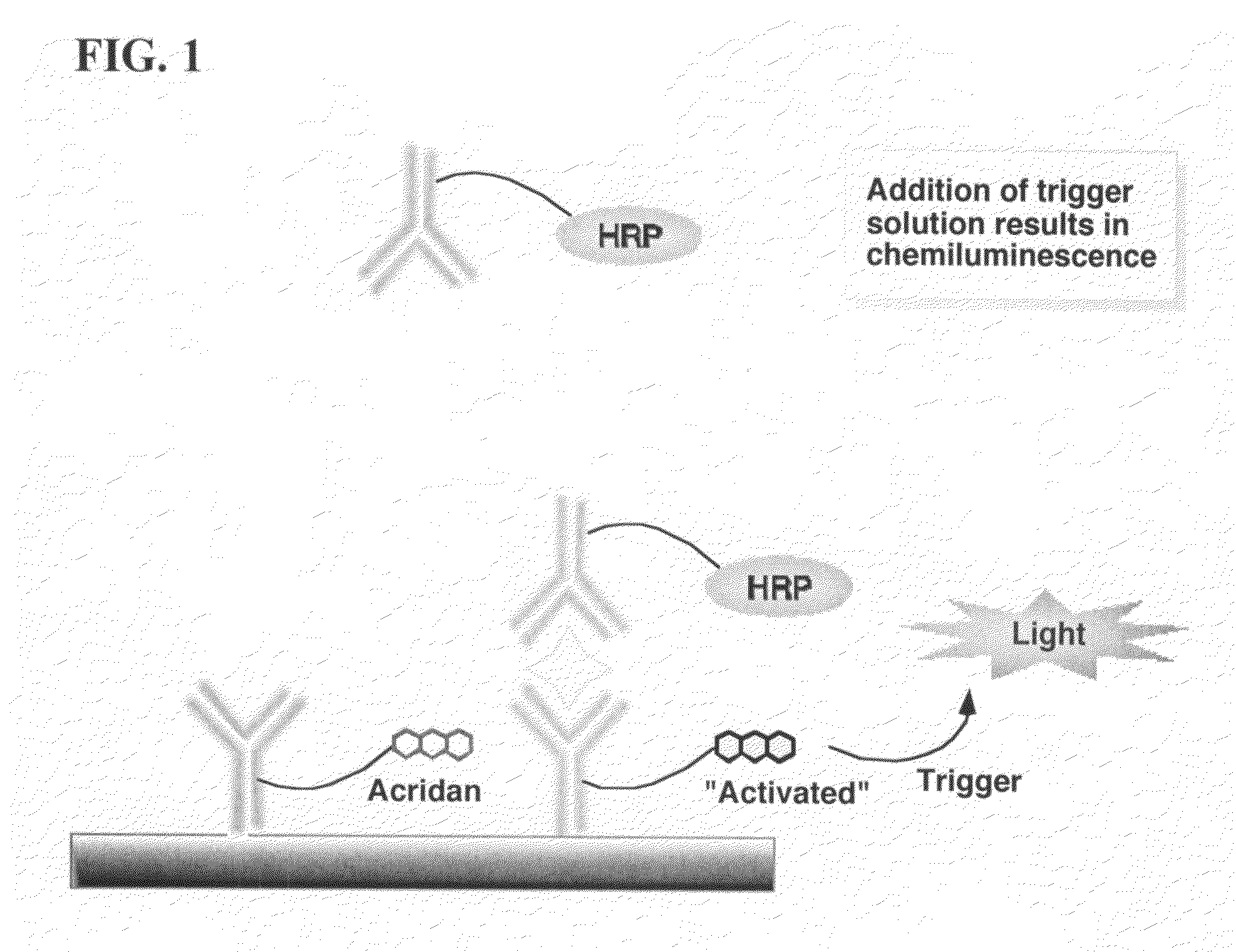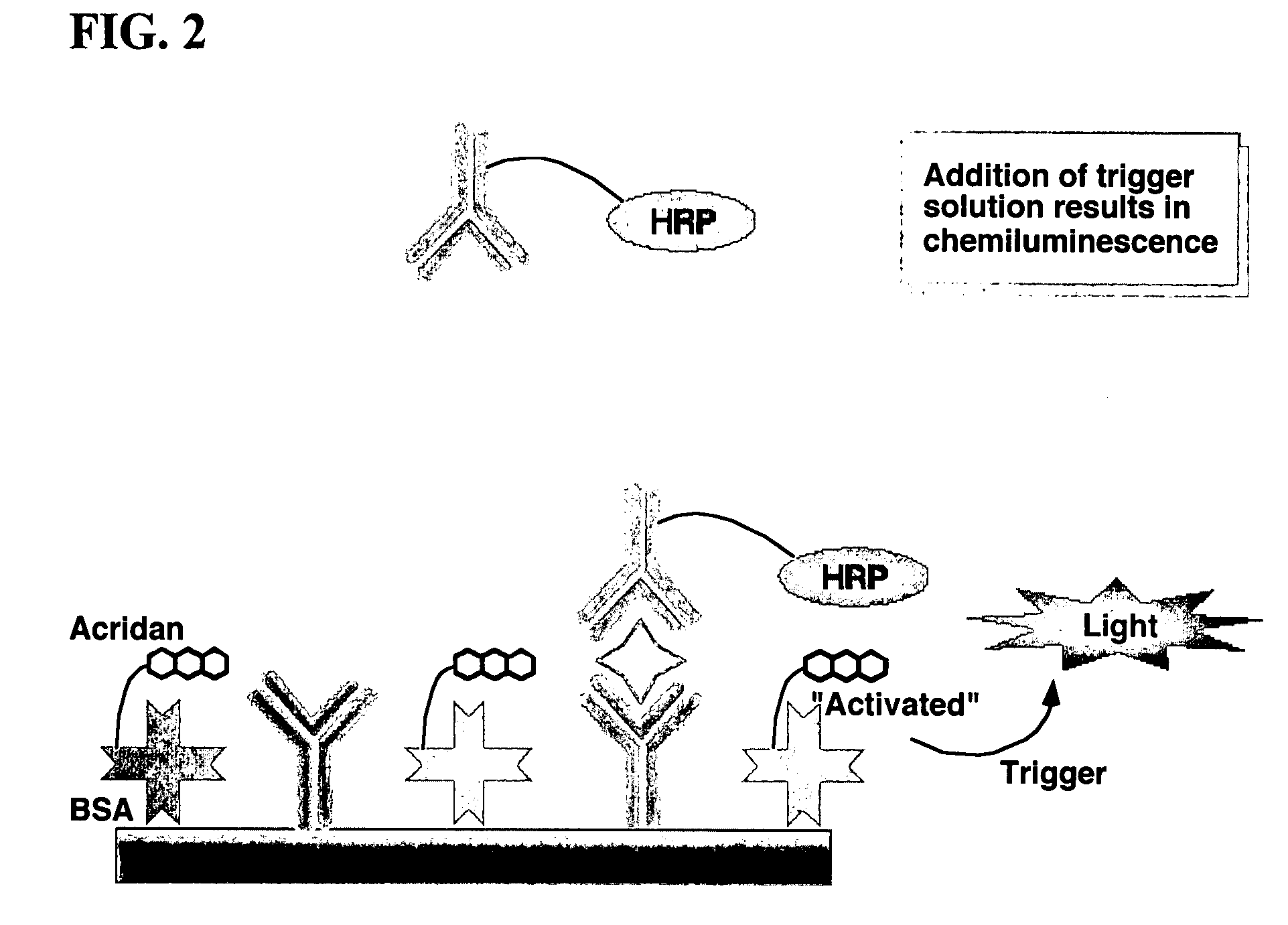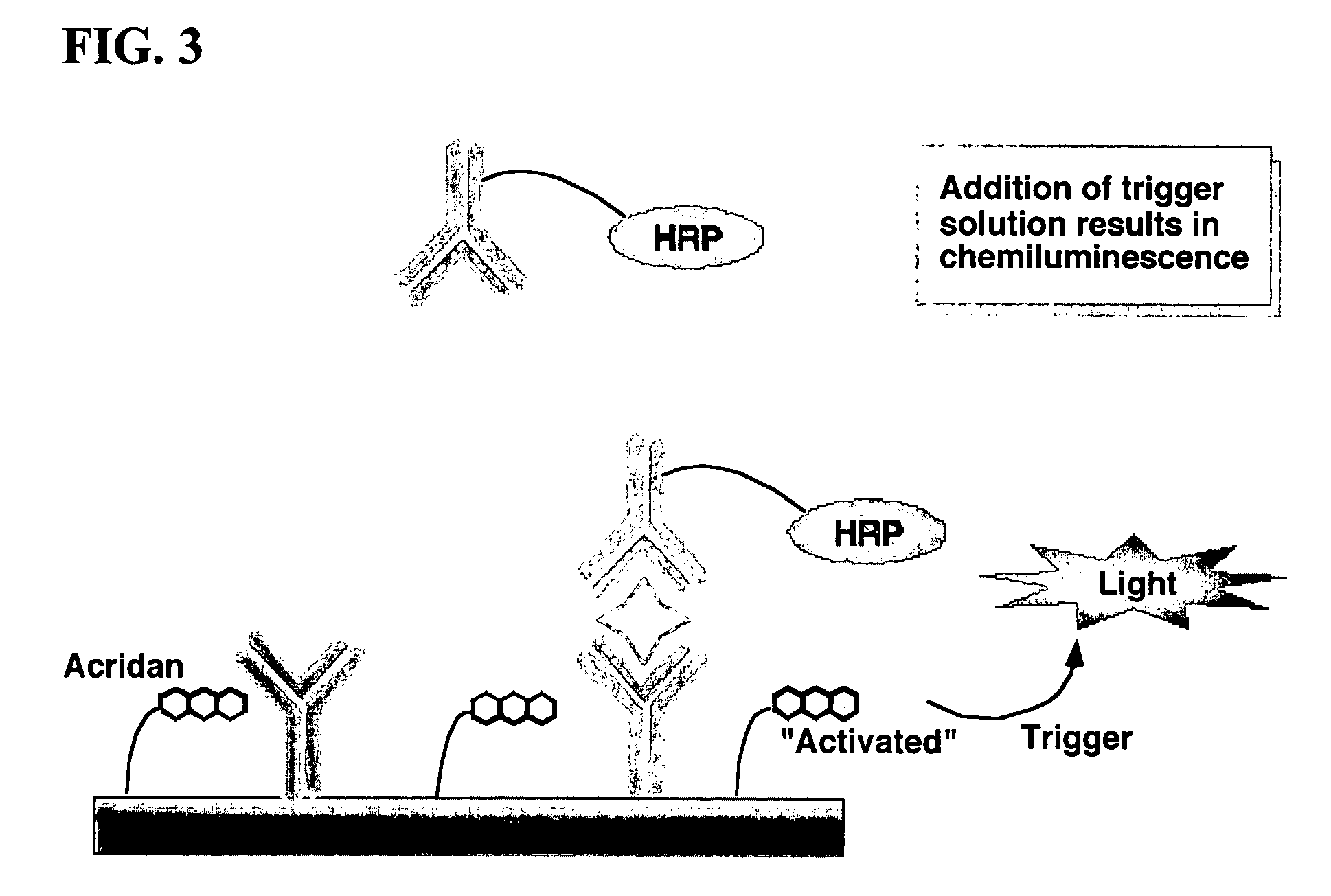Nonseparation assay methods
a technology of assays and assays, applied in the field of assay methods, can solve the problems of not experiencing widespread commercial adoption, and achieve the effect of simplifying the assay
- Summary
- Abstract
- Description
- Claims
- Application Information
AI Technical Summary
Benefits of technology
Problems solved by technology
Method used
Image
Examples
example 1
Synthesis of Compound 1
[0064]
[0065]The iodocarboxylate NHS ester was synthesized by reacting the iodocarboxylic acids with N-hydroxy succinimide using DCC as the coupling reagent.
[0066]To a solution of dithioester B (1.808 g, 5.00 mmol) in anhydrous DMF (50 mL) was added NaH (60% in mineral oil, 0.200 g, 5.00 mmol) under argon. After 4 h at room temperature NHS 3-iodopropionate A (1.485 g, 5.00 mmol) was added and the resulting mixture was stirred overnight. DMF was removed in vacuo. Column chromatography with CH2Cl2 / EtOAc (40:1) afforded 1.770 g of 1 as a yellow solid (yield 67%). 1H NMR (300 MHz, CDCl3): δ 2.30 (s, 3H), 2.74 (t, 2H), 2.83 (s, 4H), 3.01 (t, 2H), 5.31 (s, 2H), 6.88(t, 2H), 7.07 (m, 2H), 7.11-7.18 (m, 3H), 7.27 (m, 4H), 7.82 (dd, 1H), 7.89 (dd, 1H) ppm.
example 2
Synthesis of Compound 2
[0067]
[0068]A mixture of dithioester C (0.692 g, 1.50 mmol) and NaH (60% in mineral oil, 0.060 g, 1.50 mmol) in anhydrous DMF (20 mL) was stirred under argon at room temperature for 4 hours, resulting a slightly cloudy solution. NHS 6 iodohexanoate A (0.661 g, 1.95 mmol) was then added in DMF (5 mL). After 16 h, DMF was removed in vacuo. To the residue was added 10 mL of acetone followed by 20 mL of ether. The supernatant was decanted. The precipitate washed three times following the same procedures. After drying under vacuum, 1.200 g of 2 was obtained as a yellow solid. 1H NMR (300 MHz, CD3OD): δ 1.15 (m, 2H), 1.33-1.47 (m, 4H), 2.01 (p, 2H), 2.38 (t, 2H), 2.67 (t, 2H), 2.75 (t, 2H), 2.82 (s, 4H), 2.88 (t, 2H), 5.32 (s, 2H), 6.88 6.93 (m, 2H), 7.00 (t, 2H), 7.08-7.28 (m, 7H), 7.83 (d, 1H), 7.92 (d, 1H) ppm.
example 3
Synthesis of Compounds 3 and 4
[0069]
[0070]A mixture of dithioester C (1.00 g, 2.10 mmol) and NaH (60% in mineral oil, 0.087 g, 2.16 mmol) in anhydrous DMF (20 mL) was stirred under argon at room temperature for 4 hours, resulting in a slightly cloudy solution. N-6 iodohexoxysuccinimide D (0.82 g, 2.52 mmol) was then added in DMF (5 mL). The mixture was stirred over night after which DMF was removed in vacuo. The residue washed four times with 30 mL of ether giving 1.35 g of 3.
[0071]Compound 3 (0.25 g) was dissolved in 5 mL of methanol to which was added 5.0 mL of 50% aq. NH2OH. After stirring the solution for 2 days, the solvents were evaporated under vacuum. The residue washed with 6×20 mL of ether giving 0.21 g of 4. 1H NMR (300 MHz, CD3OD): δ 1.14 (m, 4H), 1.40 (m, 4H), 1.94 (p, 2H), 2.65-2.71 (m, 4H), 2.84 (t, 2H), 3.55 (t, 2H), 5.31 (s, 2H), 6.88 (d, 2H), 6.98 (q, 2H), 7.10 (m, 4H), 7.12-7.27 (m, 3H), 7.85 (t, 2H) ppm.
PUM
| Property | Measurement | Unit |
|---|---|---|
| Chemiluminescence | aaaaa | aaaaa |
Abstract
Description
Claims
Application Information
 Login to View More
Login to View More - R&D
- Intellectual Property
- Life Sciences
- Materials
- Tech Scout
- Unparalleled Data Quality
- Higher Quality Content
- 60% Fewer Hallucinations
Browse by: Latest US Patents, China's latest patents, Technical Efficacy Thesaurus, Application Domain, Technology Topic, Popular Technical Reports.
© 2025 PatSnap. All rights reserved.Legal|Privacy policy|Modern Slavery Act Transparency Statement|Sitemap|About US| Contact US: help@patsnap.com



